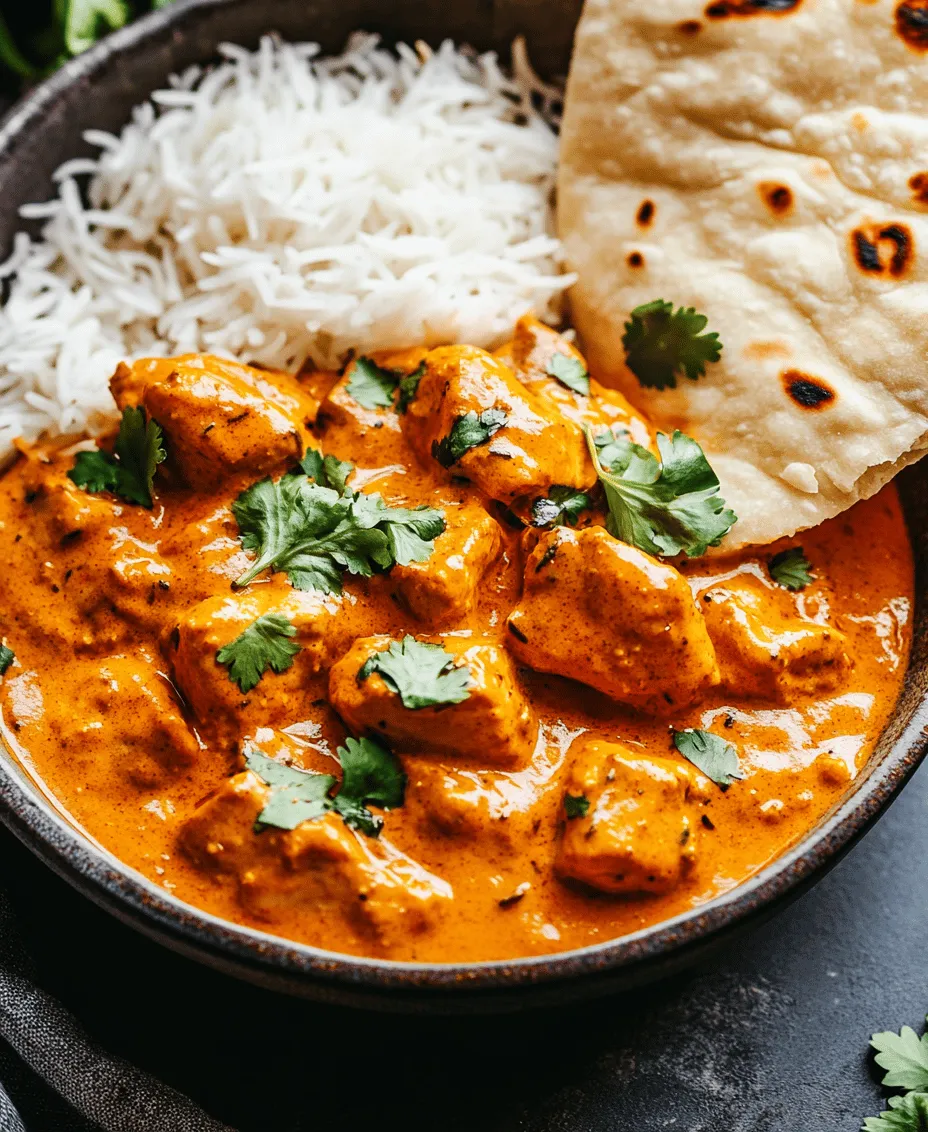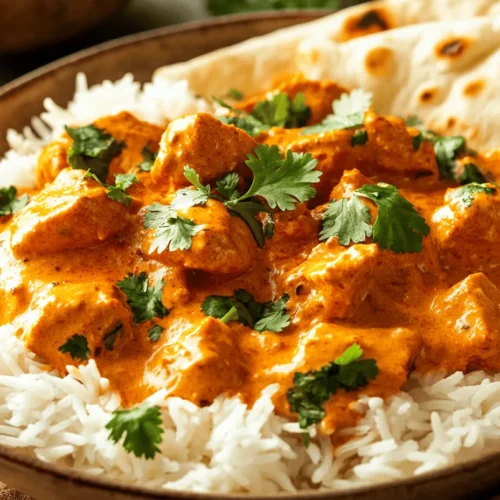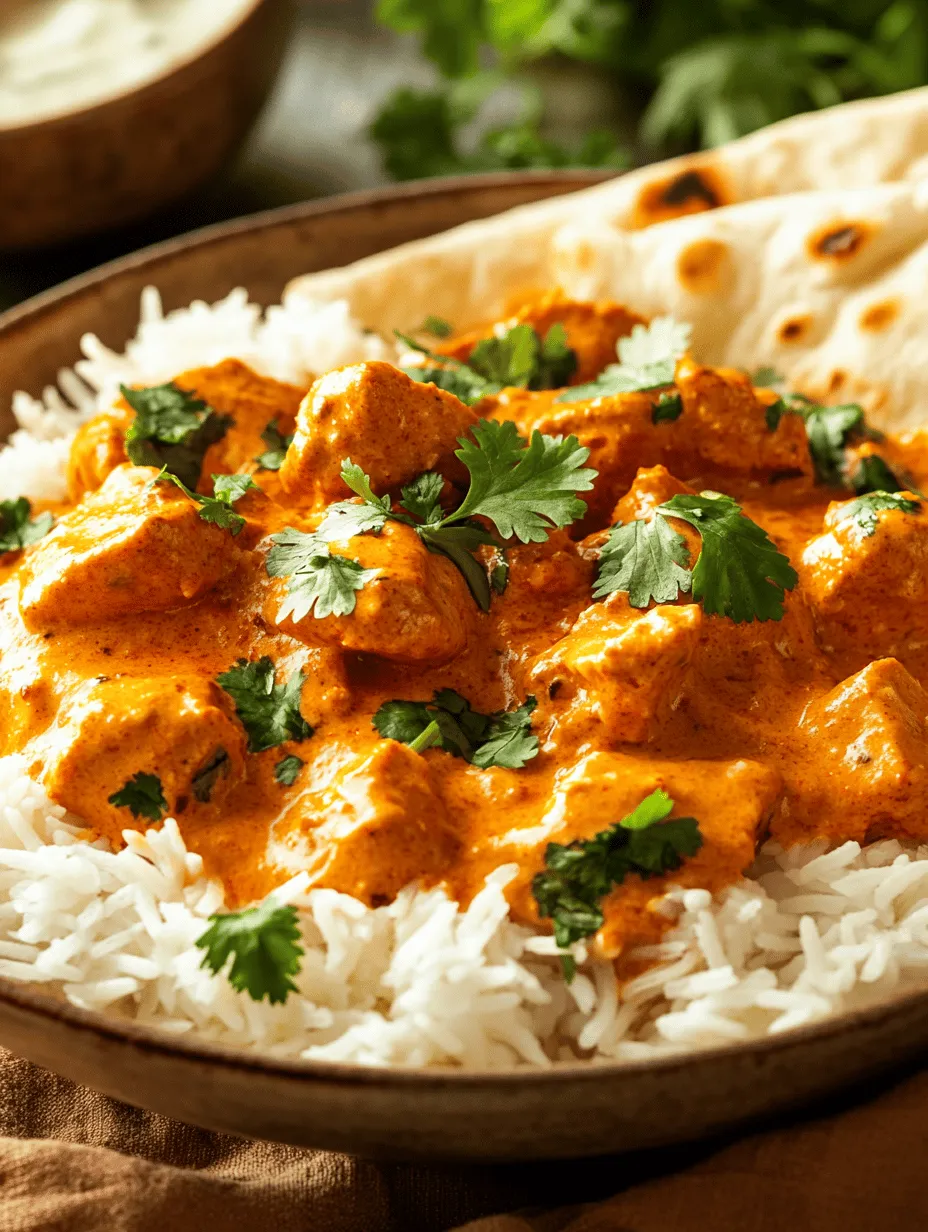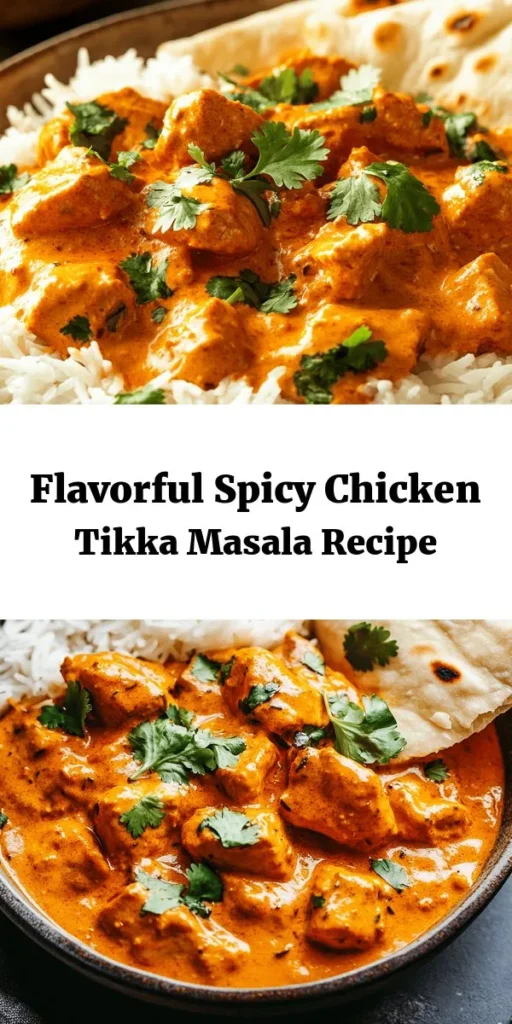Introduction
Spicy Chicken Tikka Masala is a culinary gem that has captured hearts and taste buds around the globe. Originating from the Indian subcontinent, this dish is a harmonious blend of marinated chicken pieces, grilled to perfection, and simmered in a creamy, spiced tomato sauce. Its roots can be traced back to Indian cuisine, where it’s often associated with traditional tandoori cooking methods. However, the dish has evolved significantly, particularly with the influence of British culinary traditions, leading to its status as one of the most popular dishes in Indian restaurants worldwide.
The importance of Chicken Tikka Masala in Indian cuisine cannot be overstated. It symbolizes the rich, diverse flavors that characterize Indian cooking and is a go-to dish for those seeking to experience authentic Indian flavors. The combination of tender, spiced chicken and a luscious sauce creates a delightful eating experience that is both comforting and indulgent. This recipe stands out not only for its vibrant flavors but also for its versatility; it can be served with naan, rice, or even enjoyed as a standalone dish.
In this article, we will explore the intricacies of making a Spicy Chicken Tikka Masala Delight. From the selection of key ingredients to the marination process and cooking techniques, you’ll discover how to create this dish that is sure to impress your family and friends. We will delve into every step, ensuring that you have all the knowledge needed to replicate this beloved dish in your own kitchen.
Understanding the Key Ingredients
To create the perfect Spicy Chicken Tikka Masala, understanding the key ingredients is crucial as they play a vital role in defining the dish’s flavor and texture.
The Marinade Ingredients
The marinade is the foundation of flavor for Chicken Tikka Masala. Here are the main components:
1. Chicken: Traditionally, boneless chicken thighs are preferred for their juiciness and flavor. However, boneless chicken breasts can also be used for a leaner option.
2. Yogurt: This is a vital ingredient in the marinade, as it not only adds a tangy flavor but also helps tenderize the chicken. The lactic acid in yogurt breaks down the protein fibers in the meat, resulting in a juicy and flavorful final product.
3. Lemon Juice: The acidity in lemon juice complements the yogurt, enhancing the tenderizing effect while adding brightness to the flavor profile. It balances the richness of the cream in the final sauce.
4. Spices: The use of spices is what elevates this dish to new heights. Common spices include:
– Garam Masala: A blend of spices that typically includes cinnamon, cardamom, and cloves, garam masala adds warmth and depth to the dish.
– Cumin: This spice imparts a nutty and earthy flavor, essential for authentic Indian cooking.
– Coriander: Ground coriander adds a citrusy, floral note, enhancing the overall flavor complexity.
The Masala Sauce Ingredients
The masala sauce is where the magic happens, bringing together the marinated chicken with a rich and flavorful mixture. Here are the critical ingredients for the sauce:
1. Onions: Fresh, finely chopped onions are essential as they provide a sweet and savory base for the sauce. They are usually sautéed until golden brown, adding depth to the sauce.
2. Tomatoes: Fresh, ripe tomatoes or canned tomatoes are used to create the sauce’s body. They bring acidity and sweetness, balancing the spices and cream.
3. Heavy Cream: This ingredient is crucial for achieving the characteristic richness and creaminess of Chicken Tikka Masala. It smooths out the flavors and gives the sauce a luxurious texture.
4. Additional Spices: The same spices used in the marinade may be incorporated into the sauce, along with turmeric for color and heat.
Understanding these ingredients is key to mastering the recipe. Each component contributes to the overall flavor, ensuring that every bite of the Spicy Chicken Tikka Masala Delight is bursting with authentic Indian flavors.
The Marinade Process: Building Flavors
Once you have gathered your ingredients, the next step is to prepare the marinade for the chicken. The marination process is vital as it allows the chicken to soak up all the flavors from the spices, yogurt, and lemon juice. Here’s how to do it:
1. Prepare the Marinade: In a large bowl, combine yogurt, lemon juice, garam masala, cumin, coriander, and salt. Mix well until you have a smooth paste.
2. Add the Chicken: Cut your chicken into bite-sized pieces and add them to the bowl with the marinade. Ensure that each piece is well-coated with the marinade.
3. Marinating Time: Cover the bowl with plastic wrap and refrigerate. Ideally, marinate the chicken for at least 2 hours, but for best results, aim for 6 to 12 hours. This extended marination time allows the flavors to penetrate deeply into the chicken while also tenderizing it.
4. Adjusting Spice Levels: If you prefer a milder dish, reduce the amount of chili powder or add a bit of sugar to balance the heat. Conversely, if you enjoy a spicier kick, consider adding extra chili powder or fresh green chilies to the marinade.
The Science Behind Marination
Marinating chicken is not just about flavor; it’s also about texture. The combination of acidic ingredients like yogurt and lemon juice helps to break down the proteins in the chicken, making it more tender. This process also enhances moisture retention during cooking, resulting in juicy and succulent pieces of chicken.
Additionally, marination allows the spices to infuse their flavors into the chicken, creating a more robust taste experience. The longer the chicken marinates, the more pronounced the flavors will be, leading to a dish that is truly mouthwatering.
Cooking Techniques for Perfect Chicken
After marinating, the next step is to cook the chicken. There are two primary methods for cooking chicken for Tikka Masala: grilling and baking. Each method has its advantages, and the choice depends on personal preference and available equipment.
Grilling
Grilling the chicken is the traditional method and can produce a wonderfully smoky flavor. Here’s how to do it:
1. Preheat the Grill: Preheat your grill to medium-high heat. If using a charcoal grill, make sure the coals are evenly distributed.
2. Skewering (Optional): For easier handling, you can thread the marinated chicken pieces onto skewers. If using wooden skewers, soak them in water for at least 30 minutes to prevent burning.
3. Grill the Chicken: Place the chicken on the grill and cook for about 5-7 minutes on each side, or until the chicken has a nice char and is cooked through (internal temperature of 165°F or 75°C).
Pros of Grilling: Grilling imparts a charred flavor and is faster than baking. The high heat helps to create a crispy exterior while keeping the interior juicy.
Cons of Grilling: It requires outdoor space and can be weather-dependent. Additionally, it may not be suitable for everyone if you lack a grill.
Baking
Baking is a convenient alternative that can yield excellent results too. To bake the chicken:
1. Preheat the Oven: Preheat your oven to 400°F (200°C).
2. Prepare a Baking Sheet: Line a baking sheet with aluminum foil or parchment paper for easy cleanup.
3. Arrange the Chicken: Spread the marinated chicken pieces evenly on the baking sheet, ensuring they’re not overcrowded.
4. Bake: Bake for 20-25 minutes, flipping halfway through, until the chicken is cooked through and slightly browned.
Pros of Baking: Baking is a hands-off method and allows for larger quantities of chicken to be cooked simultaneously. It is also less messy than grilling.
Cons of Baking: It may not provide the same depth of smoky flavor that grilling does, and the exterior may not be as crispy.
Tips for Perfect Char and Doneness
Regardless of the cooking method you choose, here are some tips for achieving the perfect char and doneness:
1. Use a Meat Thermometer: Always check the internal temperature of the chicken to ensure it reaches 165°F (75°C) for safe consumption.
2. Do Not Overcrowd the Cooking Surface: Whether grilling or baking, give the chicken pieces enough space to cook evenly. Overcrowding can lead to steaming rather than browning.
3. Let It Rest: After cooking, let the chicken rest for a few minutes before adding it to the masala sauce. This resting period allows the juices to redistribute throughout the meat.
As you prepare your chicken, you will be setting the stage for the final step in creating your Spicy Chicken Tikka Masala Delight. The following section will focus on creating the masala sauce, bringing together all the elements into a flavor masterpiece.

Detailed Instructions on Preparing the Masala Sauce
To create a truly exceptional Spicy Chicken Tikka Masala, the masala sauce is a critical component that requires careful attention. The first step is to prepare the base of the sauce, which primarily includes sautéing onions, garlic, and ginger.
1. Sautéing Onions: Begin by heating oil (or ghee) in a large pan over medium heat. Once hot, add finely chopped onions and stir them gently. The key here is to sauté the onions slowly until they turn golden brown. This process takes about 10-15 minutes and is essential for developing a sweet flavor that balances the spices in the dish. Caramelizing the onions enhances their natural sugars, providing a rich depth to the masala sauce.
2. Adding Aromatics: Once the onions are beautifully caramelized, add minced garlic and ginger. Stir them in and cook for an additional 2-3 minutes until fragrant. This combination of ingredients forms the aromatic foundation of your sauce.
3. Toasting Spices: Next, it’s time to toast the spices. Add your spice blend, which typically includes cumin seeds, coriander powder, garam masala, turmeric, and chili powder. Toasting spices in oil helps release their essential oils, intensifying their flavors and infusing the sauce with warmth. Stir the spices into the onion mixture for about 1-2 minutes, being careful not to burn them.
4. Tomato Base: After the spices are toasted, add crushed tomatoes or tomato puree to the pan. This will provide acidity and richness to the sauce. Stir everything together, ensuring the spices are evenly mixed with the tomatoes. Allow this mixture to simmer for about 10 minutes, stirring occasionally. The goal is to cook down the tomatoes, allowing the flavors to meld and the sauce to thicken slightly.
5. Simmering and Thickening the Sauce: To thicken the sauce further, add a splash of water if it seems too thick, or let it simmer a bit longer without a lid for a deeper concentration of flavors. You should aim for a sauce that is smooth yet thick enough to coat the back of a spoon. This stage is critical—if the sauce is too thin, it will not cling properly to the chicken.
Bringing It All Together: Combining Chicken and Sauce
Now that you have prepared a robust and flavorful masala sauce, it’s time to integrate the grilled chicken tikka.
1. Integrating the Chicken: Once the grilled chicken pieces have been prepared, cut them into bite-sized pieces if you haven’t already. Add these pieces directly into the masala sauce. Stir gently to ensure that every piece of chicken is thoroughly coated with the sauce.
2. Simmering Together: Let the chicken simmer in the sauce for at least 10 minutes. This step is essential for the flavors to meld together. The chicken will absorb the spices from the sauce, and the sauce will take on the richness of the marinated chicken.
3. Adjusting Seasoning: After simmering, taste the dish and adjust the seasoning as needed. You may want to add more salt, a pinch of sugar to balance the acidity, or an extra dash of chili powder for heat. This final adjustment is crucial for achieving the perfect balance of flavors.
Serving Suggestions and Pairings
Spicy Chicken Tikka Masala is a versatile dish that pairs excellently with various sides and garnishes.
– Best Ways to Serve: Traditionally, this dish is served hot in a shallow bowl or plate, allowing the vibrant colors of the sauce and chicken to shine.
– Sides: Basmati rice is the most popular accompaniment, as its fluffy grains absorb the rich sauce beautifully. Alternatively, serve with warm naan or roti, which can be used to scoop up the chicken and sauce.
– Garnishing: Enhance the presentation by garnishing with fresh cilantro or parsley. A sprinkle of cream can add a touch of elegance and richness.
– Complementary Dishes: Consider serving with a side of cucumber raita to cool the palate, or some roasted vegetables for added nutrition. For drinks, a light lager or a sweet mango lassi pairs wonderfully, balancing the heat of the dish while providing a refreshing contrast.
Nutritional Information and Health Benefits
Spicy Chicken Tikka Masala not only delights the taste buds but also offers substantial nutritional benefits.
– Nutritional Profile: A serving of this dish provides a good balance of macronutrients. Chicken is a fantastic source of lean protein, essential for muscle repair and growth, while the spices contribute various health benefits.
– Protein Content: The chicken in the dish provides a significant amount of protein, typically about 25-30 grams per serving, depending on the portion size. This makes it an excellent choice for those looking to increase their protein intake.
– Health Aspects of Spices: The spices used in the masala provide numerous health benefits. For instance, turmeric is known for its anti-inflammatory properties, while ginger aids digestion. Cumin is beneficial for metabolism, and chili powder can boost your metabolism.
– Making It Healthier: To accommodate dietary preferences, consider using skinless chicken breast to reduce fat content or substituting cream with coconut milk for a dairy-free option. You can also increase the vegetable content by adding bell peppers, peas, or spinach to the sauce.
Conclusion
Spicy Chicken Tikka Masala is not just a popular dish in Indian cuisine; it holds a special place in many households around the world. Its rich flavors, coupled with the warming spices, make it a comforting meal perfect for any occasion.
Whether you’re preparing a weeknight dinner for your family or hosting friends, this dish is sure to impress. The process of making Chicken Tikka Masala allows for creativity in the kitchen while respecting traditional methods.
We encourage you to try making this flavorful dish at home, exploring the nuances of spice and flavor as you go. The joy of sharing a meal like Chicken Tikka Masala transcends cultural boundaries, inviting you to experience the warmth of togetherness and the beauty of culinary traditions.



